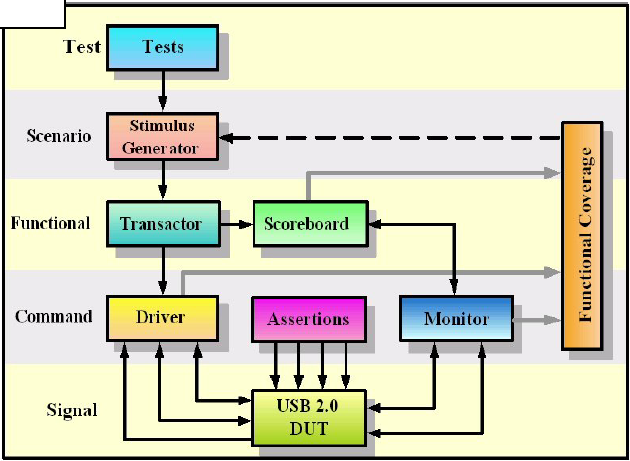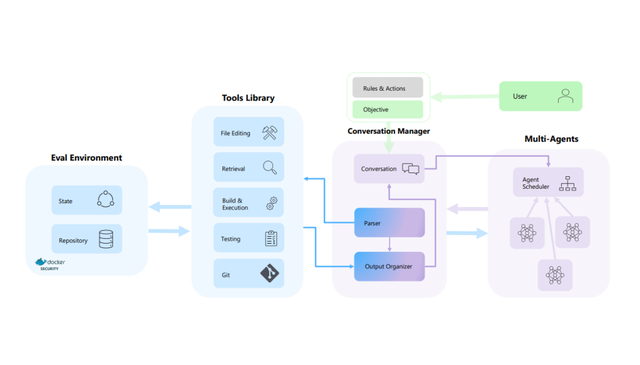Packing And Unpacking
Packing performs concatenation of scalars, strings, list elements, or struct fields in the order that you specify. Unpacking performs the reverse operation, splitting a single expression into multiple expressions.
As part of the concatenation or splitting process, packing and unpacking also perform type conversion between any of the following:
- scalars
- strings
- lists and list subtypes
pack()
| Packing a scalar expression creates an ordered bit stream by concatenating the bits of the expression together. |
| Packing are of two types: |
- packing.low
- packing.high
Example - pack()
1 <'
2 struct instruction {
3 %opcode : uint (bits : 3);
4 %operand : uint (bits : 5);
5 %address : uint (bits : 8);
6 ! data_packed_high : list of bit;
7 ! data_packed_low : list of bit;
8 keep opcode == 0b100;
9 keep operand == 0b11001;
10 keep address == 0b00001111;
11 post_generate() is also {
12 data_packed_low = pack(packing.low, opcode, operand);
13 data_packed_high = pack(packing.high, opcode, operand);
14 };
15 };
16
17 extend sys {
18 ins : instruction;
19 run() is also {
20 print ins using bin;
21 print ins.data_packed_low using bin;
22 print ins.data_packed_high using bin;
23 };
24 };
25 '>Output - pack()ins = instruction-@0: instruction
---------------------------------------------- @packing1
0 %opcode: 0b100
1 %operand: 0b11001
2 %address: 0b00001111
3 !data_packed_high: (8 items)
4 !data_packed_low: (8 items)
ins.data_packed_low = (8 items, bin):
1 1 0 0 1 1 0 0 .0
ins.data_packed_high = (8 items, bin):
1 0 0 1 1 0 0 1 .0
unpack()
Unpacking a bit stream into a scalar expression fills the scalar expression, starting by default by putting the lowest bit of the bit stream into the lowest bit of the scalar expression.
| Unpacking are of two types: |
- packing.low
- packing.high
Example - unpack()1 <'
2 struct instruction {
3 %opcode : uint (bits : 3);
4 %operand : uint (bits : 5);
5 %address : uint (bits : 8);
6 };
7
8 extend sys {
9 post_generate() is also {
10 var inst : instruction;
11 var packed_data: list of bit;
12 packed_data = {1;1;1;1;0;0;0;0;1;0;0;1;1;0;0;1};
13 unpack(packing.high, packed_data, inst);
14 print packed_data using bin;
15 out("Unpacking high");
16 print inst using bin;
17 unpack(packing.low, packed_data, inst);
18 out("Unpacking low");
19 print inst using bin;
20 };
21 };
22 '>
Output - unpack()packed_data = (16 items, bin):
1 0 0 1 1 0 0 1 0 0 0 0 1 1 1 1 .0
Unpacking high
inst = instruction-@0: instruction
---------------------------------------------- @packing2
0 %opcode: 0b100
1 %operand: 0b11001
2 %address: 0b00001111
Unpacking low
inst = instruction-@0: instruction
---------------------------------------------- @packing2
0 %opcode: 0b111
1 %operand: 0b00001
2 %address: 0b10011001 Bạn Có Đam Mê Với Vi Mạch hay Nhúng - Bạn Muốn Trau Dồi Thêm Kĩ Năng
Mong Muốn Có Thêm Cơ Hội Trong Công Việc
Và Trở Thành Một Người Có Giá Trị Hơn
Mong Muốn Có Thêm Cơ Hội Trong Công Việc
Và Trở Thành Một Người Có Giá Trị Hơn
















